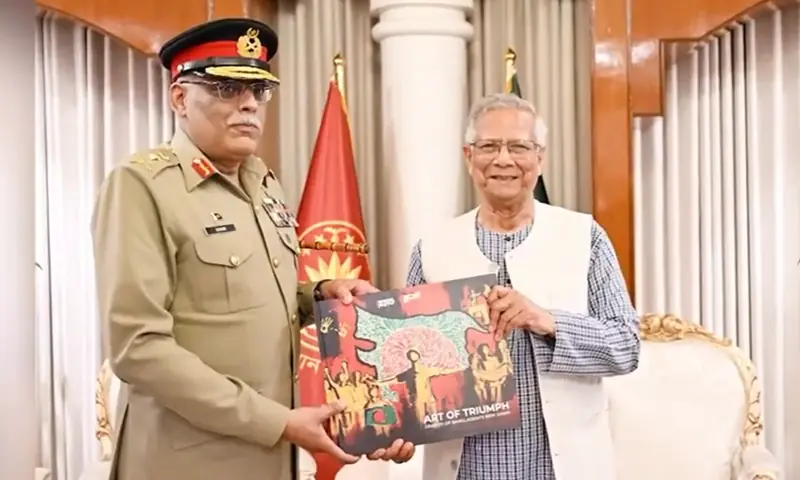Chairman Joint Chiefs of Staff Committee (CJCSC) General Sahir Shamshad Mirza met Bangladesh’s Chief Adviser Muhammad Yunus in Dhaka, marking a new chapter in the strengthening of Pakistan–Bangladesh defence and security cooperation, according to the Inter-Services Public Relations (ISPR).
During their detailed discussions, both sides reviewed the regional and global security environment and reaffirmed the importance of deepening mutual defence collaboration. General Mirza highlighted Pakistan’s appreciation for its longstanding fraternal ties with Bangladesh and underscored the shared resolve to enhance relations on the principles of sovereign equality and mutual respect.
The two sides expressed optimism about expanding military-to-military engagements, including training exchanges, joint initiatives, and strategic dialogue to bolster cooperation between the two armed forces.
During his visit, General Mirza also visited the School of Infantry and Tactics in Sylhet, where he interacted with faculty and cadets. The Bangladeshi civil-military leadership praised the professional excellence of the Pakistan Armed Forces, particularly their sacrifices and achievements in the fight against terrorism.
The CJCSC also met Bangladesh’s Chief of Naval Staff Admiral Mohammad Nazmul Hassan, Chief of Air Staff Air Chief Marshal Hasan Mahmood Khan, and Principal Staff Officer Lieutenant General SM Kamrul Hassan.
The visit comes amid warming Pakistan–Bangladesh ties following the student-led ouster of former Prime Minister Sheikh Hasina in August 2024. Since then, Dhaka’s relations with India have cooled, allowing Islamabad and Dhaka to rebuild diplomatic and economic engagement.
Recent high-level interactions—including Prime Minister Shehbaz Sharif’s meeting with Muhammad Yunus at the UN General Assembly and Deputy PM Ishaq Dar’s visit to Dhaka in August 2025—have paved the way for deeper regional cooperation. Earlier this year, the two countries also began direct government-to-government trade, marking the import of 50,000 tonnes of rice from Bangladesh, ending decades of limited bilateral commerce.

